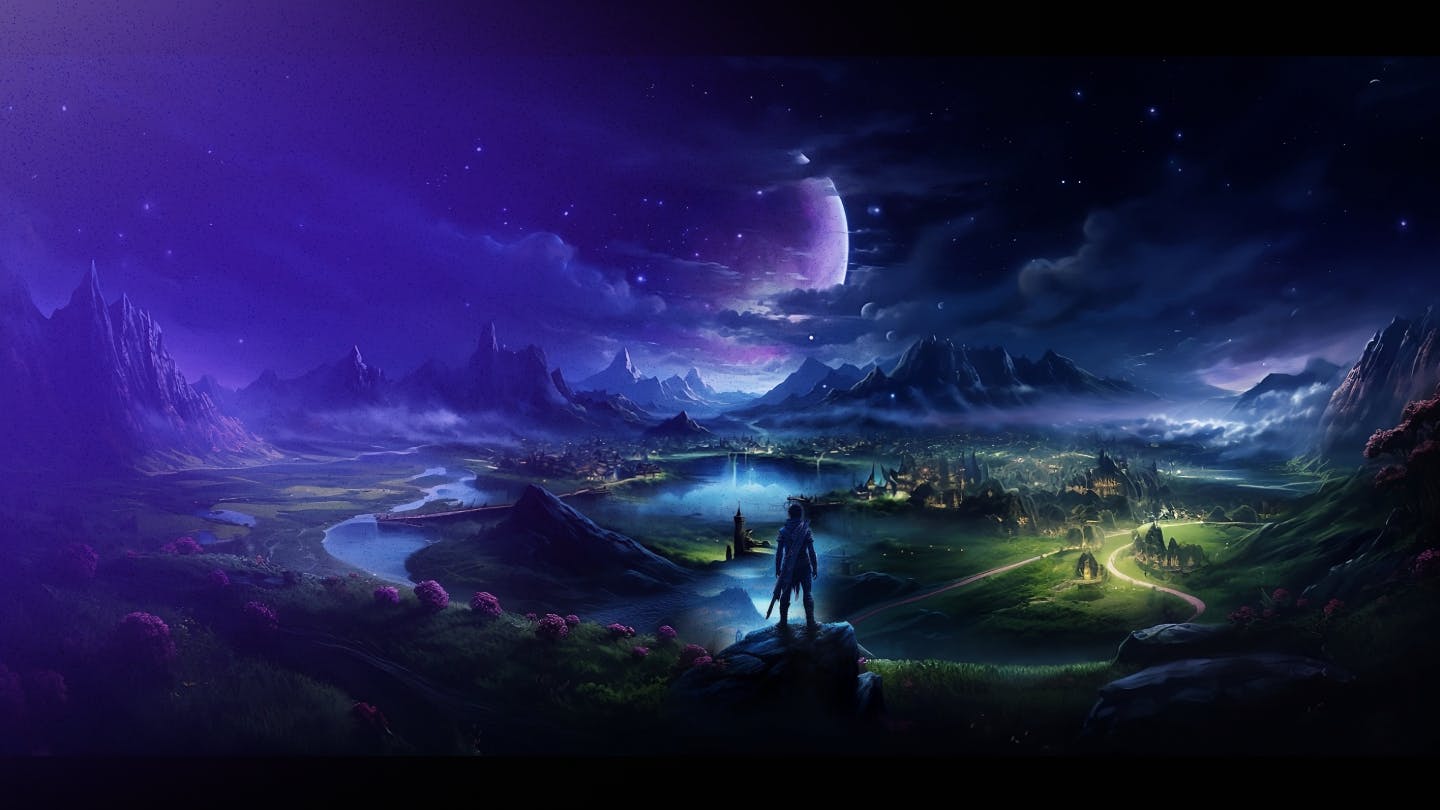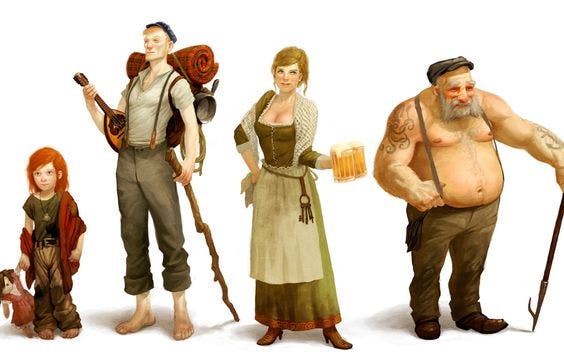Check out what's new:
What is an NPC? Tracing the history (and future) of NPC meaning in games, memes, and Tik Tok
We look at the definition of NPC, how NPC meaning changes across contexts, what NPCs will look like in the future with AI characters, and how that shift could change the future definition of NPCs.

Whether you know exactly what an NPC is and you’re just curious how the term has evolved – or you heard the term for the first time and have no clue what it means – you’re in the right place.
We’re taking a deep dive into the definition of NPC, how NPC meaning changes across contexts, what NPCs will look like in the future with the introduction of AI characters, and how that shift could drastically change the future definition of NPCs.
What is an NPC?

An NPC is the abbreviation used to refer to a non-player character or non-playable character in a game. While it’s popularly believed that the term originated in video games, it actually was first coined in 1975 by the game Dungeons and Dragons.
As the first commercial tabletop RPG, D&D called for the creation of characters controlled by the gamemaster or dungeon master to drive the narrative forward. In the D&D world, that meant characters like merchants, orcs, enemies, or wizards to add intrigue and excitement to the game.
The term later gained popularity to refer to characters in video games controlled by the game mechanism rather than a player. These make up the majority of characters that populate game worlds – from wisecracking sidekicks to mysterious quest givers. While NPCs can be integral parts of the game narrative, because they’re controlled by a computer, they tend to have a predetermined set of behaviors, movements, and utterances.
For that reason, they’re known for jerky and repetitive movements, walking back and forth or in circles, only being able to say a few stock phrases, or even glitching. NPCs’ reputations aren’t helped by the fact that they’re often created to engage in behavior that doesn’t always make sense – like attacking players despite near-certain death or standing in the same place for hours waiting for the player. For that reason, NPCs have gained a reputation for lacking self-awareness and being awkward, dimwitted, or even annoying.
Fun Fact: Groups of NPC enemies in a video game are often called ‘mobs,’ short for ‘mobiles’ or ‘mobile objects.’ The term was first coined by Richard Bartle, the developer of the first multiplayer dungeon game MUD1.
NPC meaning in games
While the term ‘non-player character’ refers to any characters in a game world that aren’t playable by the gamer, it’s hard to settle on a concrete meaning for NPCs in video games. Just like not all characters in movies and TV shows have the same degree of depth or backstory, different NPCs can play different roles in games.
NPC sidekicks, for example, are major characters who follow and help the player and, as such, are often beloved by fans. Similarly, NPC quest givers sometimes play major roles in game narratives. These types of NPCs often have fully developed backstories and extensive scripted dialogues.
Complex NPCs are fully realized and memorable characters. Think Cicero in Elder Scrolls V: Skyrim who has an entire journal detailing his histories and thoughts. Similarly, Gaunter O’Dimm from The Witcher 3:Wild Hunt plays the role of a villain with sinister motivations. Players generally learn about and engage with these complex NPC characters via cut scenes, scripted dialogues, and game play.
But what game studios have the time or budget to add that level of detail or produce the scripted assets required to make all NPCs full, rounded characters? Game worlds need to be populated somehow and solution has often been to create a bunch of similar characters and control them via rudimentary GOFAI artificial intelligence.
The majority of NPCs:
- Know the paths they’re able to walk and don’t diverge from them
- Have a few catchphrases at the ready
- Can defend themselves, if needed
- Have awkward movements
- Act like a hive mind in reaction to unfolding events
- Appear oblivious to things going on around them
- Don’t understand or interact responsively
These kinds of NPCs don’t just break the fourth wall in games – they’ve become a bit of a joke among players. Gamers often find it funny to mess with them by putting things in their paths or trying to kill them, just to see what happens. While complex NPCs often become fan favorites, no one cares about a non-descript merchant with only one line of dialogue.
Fun Fact: According to a 2021 ranking by Den of Geeks, the top 5 most memorable NPCs are 1) M’aiq the Liar from The Elder Scrolls 2) Cave Johnson from Portal 2 3) Solaire of Astora from Dark Souls 4) HK-47 from Star Wars: Knights of the Old Republic 5) Tom Nook from Animal Crossing
NPC meaning in memes and insults
Using the term NPC as an insult is a relatively new phenomenon. It started in 2016 when someone wrote a post defining a type of person who was a ‘human NPCs.’ The post explained these were people who always, “use the same buzzwords and hackneyed arguments,” and “show discomfort when you break the status quo.” The poster compared this phenomenon to what happens in video games where you talk to the same character twice and they give you the exact same lines word for word.
This meaning of the term NPC broke into the mainstream in 2018 when it was used via a version of the Wojak meme known as the NPC Wojak.
NPC meaning on Tik Tok

Like most popular aspects of internet culture, NPC memes have evolved over time. More recently, they’ve taken over Tik Tok.
Gamers and other video creators have created videos parodying the awkward behaviors, movements, and utterances of NPCs in video games in order to show how unnatural they are. Watching a girl pretend to be an NPC going on a date or a whole dorm room of students walk and talk like NPC characters makes gamers laugh because it underscores how far from natural video game NPCs currently act. Unsurprisingly, many of these videos have gone viral.
Another genre of NPC videos have also become a Tik Tok trend. In these, users record strangers and claim that these other people are NPCs.
Fun Fact: Some have identified the increased use of NPCs to refer to other people as connected with the Simulation Hypothesis. A theory popularized by philosopher Nick Bostrom, it proposes that all existence is a simulated reality. Others believe that it has been influenced by the movie Free Guy where Ryan Reynolds starred as an NPC that becomes conscious.
The future of NPCs
One of the reasons gamers mock the robotic nature of NPCs so often is that they’re one of the few things that have remained static about video games as production values around other aspects of games have improved dramatically. Graphics, game play, and game worlds, for example, are all unrecognizable from where they were a decade ago.
But NPCs? They’re still walking in the same circles, moving in the same jerky manners, and mindlessly repeating the same catchphrases. The robotic nature of NPCs sticks out amidst the rest of the game’s high production values.
But what if there was another way? At Inworld, we’re focused on bringing intelligent NPCs to video games. We create AI-driven brains for all types of characters via 20 different machine learning models. Want a merchant who knows more than five sentences and who can understand you when you talk directly to them?
We can create NPCs with full backstories, quick senses of humor, and deep understandings of a game world in just a few minutes in our studio. And we also power those characters’ facial expressions, movements, interactions, and behaviors to create lifelike and fully realized characters. You could talk to an Inworld merchant for hours without game designers needing to elaborately script every utterance.
And, while you might not want to speak to a merchant for hours, imagine how Inworld’s technology could power complex villains, deeply engaging sidekicks -- or quest givers who will actually answer your questions rather than just utter a few enigmatic lines before they disappear.
The future definition of NPC
Fast forward 10 years -- what do you think you’ll find as an answer if you search ‘What is an NPC?’ Probably some historic articles talking about how it used to be a popular insult and meme but that the term lost traction as soon as NPCs evolved to become complex, engaging, and lifelike AI-driven characters.
Expect the next generation to ask you what those videos of people moving robotically and calling themselves NPCs are supposed to be about when all they’ve known are dynamic NPCs that move in realistic ways and interact in lifelike manners.
Want a glimpse into the future of NPCs? Create an AI character in our studio in minutes by just typing and toggling a few buttons. Then, see if your stereotypes of NPCs hold up after talking to an Inworld character!